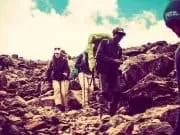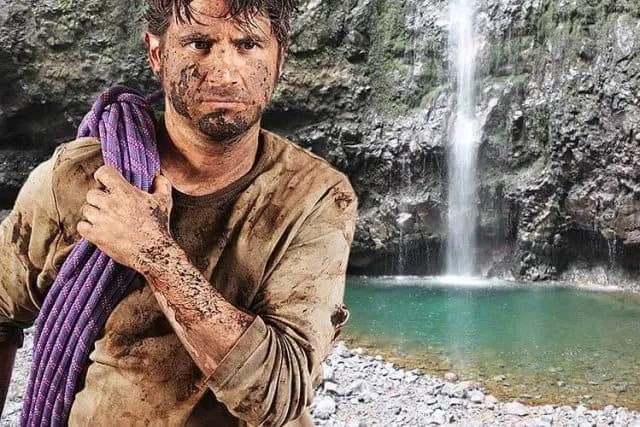It was 17 of January 2009. An Australian Coastwatch plane was on a routine flight across the Torres Strait, to spot illegal immigrants trying to enter Australia through Indonesia. By mid-day, they spotted something unusual. There was an icebox, the one usually installed on fishing boats, floating on the surface but it didn’t seem to have fish in it. Two men were standing inside it and waving their shirts to call attention. The aircraft crew immediately called a rescue helicopter and, when the men were finally winched up into the helicopter, they had a courageous and inspiring story to tell.

The two men were on a Thai fishing boat with total 20 crewmembers when the vessel broke under the high pressure of Cyclone Charlotte. While other people might have searched for planks to float through the sea, the two were lucky to climb into the icebox. It was because of the icebox that they were able to survive under 50-knot winds and unstoppable rain. The icebox also contained fish pieces that they used to fight starvation. It also helped them to collect fresh water from rain. However, it was not the icebox that made them survive 25 days in a shark-packed sea with unbearable weather and nothing much to eat except raw fish. It was their attitude, their strong survival mindset.

Unfortunately, a survivor’s attitude is not that common. Some give up and die without fighting back.
Still, there are a few who have built this strong survival mindset. We should use those people as inspiration. But, first, what is survival attitude? How can one develop it? How can one use their mindset to survive during catastrophes? Pay close attention – one day you might become one of these survivors.
Table Of Contents
Natural Survival Traits
We, the Homo Sapiens, are the only survivors of all human species. Our ancestors developed certain traits during long-forgotten and far away times that made them the survivor species. We inherited these genes, and they can be an asset for us at a time of trial:
- Adaptability: Scientists believe our ancestors’ adaptability to be the main reason they could live through the global cooling period. In fact, some argue that the differences in skulls of ancient humans, all excavated from Africa and belonging to a similar era, does not prove the existence of multiple human species at that time. Their research only covers a “short” 200.000 years period of human evolution and applies only to the four species believed to have lived during that era. Based on this new one species theory, they claim that, over extended periods of time, humans have a natural ability to change their physical appearance and abilities. The trigger for these transformations was a changing environment, food sources, etc.
As their descendant, you also have this natural ability to adapt, even over a significantly shorter period. With a little mental and physical training, you can learn to change your lifestyle as per the demands of changing time. - Diversity in food choices: Another trait that experts found to make our ancestors survive in the changing world environment was their diverse diet. They could switch from grass to meat at times of low vegetation and could eat any animal or bird they were able to hunt with their primitive tools. This adaptable diet allowed them to fulfill their calorie requirements while sources of energy were changing along with the environment.
You are naturally omnivorous; get yourself out of the social restrictions on food choices. Try eating what normal people around you do not eat. If you are out in the wild, just make sure you don’t eat anything poisonous. - Community building: Taking body size into account, the human brain is bigger than that of animals. However, it took almost 2 million years to get that big. The large brain you have received from your ancestors allows you to be a “social animal.” Humans were able to build much stronger communities that helped them survive as a team.
You have certain strengths, but you cannot be master of all trades. When in an emergency situation, do not try to do everything by yourself. Instead, team up with other people. Experts believe that the benefits of group survival outweigh the insignificant disadvantages like arguments, noise, the need for more resources, etc. - Fight or flight: There is a natural mechanism in our body triggered by any threat to survival. Walter B. Cannon called it the fight or flight response. As soon as our mind detects danger, it gives signals to certain hormonal glands to secrete hormones that can give us a boost of energy needed for fighting or running.
This naturally encoded mechanism is your main survival advantage that you inherited from more primitive times. You are capable of some extraordinary physical feats to protect yourself from danger once fight or flight mode turns on. Your immunity increases for a short period, giving you the ability to take small risks to live through the difficult time.
Character Traits of a Survivor

While we all have similar natural traits to survive, not everyone is a survivor. Siebert did a years-long research to find why some people can handle stressful situations with more strength and intelligence and found certain character traits that make survivors different from normal human beings. The book is pretty long to read so I have listed main traits for you below:
- Composure: When the boost of energy we receive as a result of flight or fight response, we often start taking risks. We often over-estimate what we can do and get ourselves stuck with a much bigger problem. A survivor knows what he can do already, so he makes the best use of this extra energy. Not wasting the energy in shouting and running here and there, he remains calm at times of danger and plans his moves before acting.
- Perseverance: Survival requires immediate action, but it also involves a lot of patience and persistence. You are not going to get clear of danger in a few seconds; most survivors had to spend days, weeks or even months fighting for their survival. They were able to get through that time through patience and firm faith.
- Self-confidence: Blaming others and becoming a victim have never solved any problem. To be a survivor, you have to take responsibility and must believe in yourself. You ought to tell yourself that you will be rid the threat sooner or later. Unless you consider yourself a survivor, you cannot be a survivor.
- Positivity: Survivors can take out something good from even the most painful experiences of life. Many survivors Siebert met were abused, raped, tortured, deceived, robbed and had a past full of scars. They learned how to survive and live after those experiences. Later in life, when a catastrophe hit them, they were well prepared to get out of it as a winner. Losing once can make you a winner if you take your loss positively.
Catastrophe Survival vs. Disease Survival
While some believe bad luck causes the disease, the research proves that is not always the case. Some scientists claim that 50% of cancer cases could have been avoided through lifestyle changes. Other experts have reached similar conclusions and believe that more than four in 10 cancer types are preventable through keeping a healthy diet and regular physical activity.
However surviving a disease has its escalating difficulties. You should know the difference between catastrophe survival and disease survival so to develop separate skills for each:
| Disaster Survival | Disease Survival |
|---|---|
| Catastrophe survival is short-term survival; you have to keep fighting for not more than a few months. Disease Survival is long-term survival; you have to change your lifestyle for the rest of your days to enjoy good health. Actual survival practice during a catastrophe begins from the moment the disaster occurs. While one can prepare for what to do when get lost in an exotic jungle, the real act only starts when you are already lost. | Actual survival practice in disease survival has to start even before you diagnosed with a disease. If you are part of a high-risk diabetes population, you have to change your lifestyle to reduce the chance of ever being diagnosed with diabetes. |
| Once the hazard goes away, you can live a normal life. Although you will be affected psychologically, you start forgetting it as time passes. | You can not stop being a part of a high disease risk population if it is in your genes. At least not without highly specialized treatment (if one exists). So you will have to keep fighting and trying to prevent it throughout your life. |
| Catastrophe survival requires fast thinking and on the spot decision making. You won’t have hours to decide what object to hold on to while your boat is broken in pieces. | Disease survival requires careful planning and long-term decisions. While in some emergency situations, you need to make a decision instantly, in most cases you have ample time to decide the treatment and lifestyle changes you need. |
How To Develop A Strong Survival Mindset
Knowing what makes a survivor is different than from developing a survivor mental attitude. Here are some tips from psychologists on developing a survival attitude when something unusual hits:
- Don’t panic: Disasters happens unannounced, and you cannot be fully prepared to deal with it. While it’s good to get survival training and have an emergency kit close to you, the best things to keep with you are calm & courage. Keeping your mind cool helps you make the right decisions when it’s do or die situation.
- Take responsibility: You are now in charge of the situation. Don’t blame the world for being so cruel, God for sending a famine, parents for not paying for your karate training, a friend for leaving you to face danger alone, government for not providing what you thought was required. You and only you can make a difference.
- Believe in yourself but don’t become over-confident: Know what you can do and what you can’t do. Do not go into victim mood thinking you cannot do anything. Likewise, don’t start believing that you can be a firefighter, a mountain climber, a pilot or driver. These things require not just energy but skills and knowledge, which you might not have.
- Have a clear mind: Tell yourself some mantra like “Act, then Wait” to clear your thoughts. Decide what your primary goal is and keep repeating the goal to yourself to keep focused.
Survival Attitude Examples
Law enforcement agencies: People working in law enforcement agencies are prone to dangerous situations more often than we are. They are to deal with creepy stalkers, innocent-looking serial killers, sociopaths and they can never predict with accuracy what is going on inside the mind of a criminal. Hence, they need to be well prepared and to have a combative mindset. A combative survival mindset of a police officer is a combination of:
- confidence in skills gained through training
- regular practice of combat skills
- ability to fight back the fears and use the learned skills on streets
The skills a police officer learn during training should have to pass through 3S test:
- Simple in execution
- Makes sense
- Tried and tested on Street

Mountaineers: Only 5% of mountaineers climbing the Mount Everest died during the adventure, but the percentage of those received injuries is much higher. While you can use proper training and survival gear to increase your chances of being part of the 95% that come back alive, it is harder to get back home unscathed. In addition to the training mountaineers receive to help them survive the climb, here are some important strategies they use to be a survivor:
- Know which risks they cannot afford to take: For regular climbers, it’s usual to take 2-3 attempts to finally reach the peak. They know when to stop climbing. They know the mountain is not going anywhere and if they do not take risks, they will eventually be able to restart their journey.
- Follow weather forecast religiously: Weather is your main enemy while climbing. Fortunately, you can get a somewhat accurate weather forecast for the next couple of days. Climbers follow these weather forecasts to protect themselves from hurricanes and ice falls.
- Hydrate yourself: At high altitude, dehydration is a common problem causing dizziness, frostbite or headaches. So climbers keep a large supply of fresh water with them and keep drinking much more than normal. You cannot afford to be unconscious while hanging with a rope clipped on a cliff.
- By ready for strange occurrences: High altitude also causes strange psychological reactions. Our brain responses to low oxygen level can cause depression, hallucination, or even psychosis. Be mindful of such occurrences and pre-plan your survival strategy.
Survival Advice
Nothing is constant in this world except constant change. Something that’s against you right now might turn into an opportunity in the future.
What’s Your Survival Story?
Are you a survivor too? Share with us your very own stories of survival and tell us what hindered your progress and what prepared you for it.

















